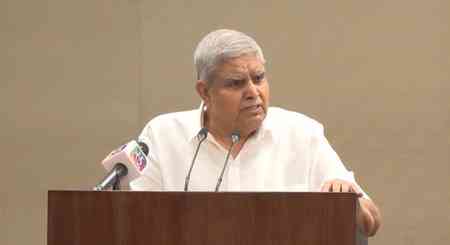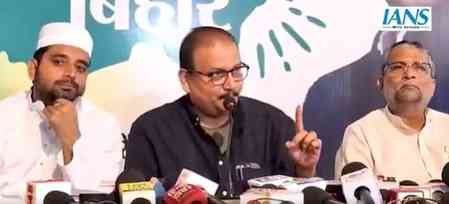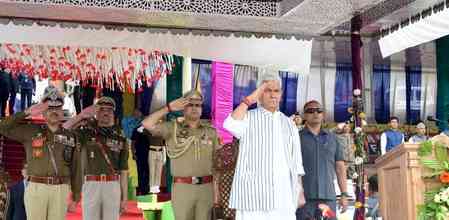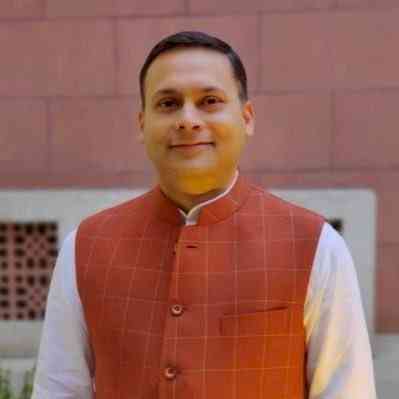'How come a category beyond law has secured immunity', VP Dhankhar raises questions in judges cash row case
Vice President Jagdeep Dhankhar on Thursday expressed dismay at the turn of events following the incident of a large amount of cash allegedly found at the Delhi residence of a High Court judge. He questioned the constitutional validity of the Supreme Court-appointed Commission probing the case, and also said the Constitution has accorded immunity from prosecution only to the President and Governors, and there cannot be a category beyond that.

New Delhi, April 17 (IANS) Vice President Jagdeep Dhankhar on Thursday expressed dismay at the turn of events following the incident of a large amount of cash allegedly found at the Delhi residence of a High Court judge. He questioned the constitutional validity of the Supreme Court-appointed Commission probing the case, and also said the Constitution has accorded immunity from prosecution only to the President and Governors, and there cannot be a category beyond that.
“It has now been over a month. Even if it is a can of worms. Even if there are skeletons in the cupboard, time to blow up the can. Time for its lid to go out. And time for the cupboard to collapse. Let the worms and skeletons be in the public domain so that cleansing takes place,” he said this on an incident where burnt currency notes were allegedly found at the residential premises of a Delhi High Court judge, last month.
Dhankhar said this while addressing the 6th batch of Rajya Sabha interns at the Vice-President’s Enclave.
He said, “Let me take the most recent incidents. They are dominating our minds. An event happened on the night of the 14th and 15th of March in New Delhi, at the residence of a judge. For seven days, no one knew about it. We have to ask questions to ourselves. Is the delay explainable? Condonable? Does it not raise certain fundamental questions? In any ordinary situation, and ordinary situations define the rule of law -- things would have been different. It was only on 21st March, disclosed by a newspaper, that people of the country were shocked as never before. They were in some kind of limbo, deeply concerned and worried at this explosive, alarming exposé."
"Thereafter, fortunately, in the public domain, we had input from an authoritative source, the Supreme Court of India. And the input indicated culpability. Input did not lead to doubt that something was amiss. Something required to be investigated. Now the nation waits with bated breath. The nation is restive because one of our institutions, to which people have always looked up with highest respect and deference, was put in the dock.”
The Vice President said, “In a democratic nation purity of its criminal justice system defines its direction. Investigation is required. Boys and girls, no investigation under law is in progress at the moment. Because for a criminal investigation, the initiation has to be by an FIR, First Information Report. It is not there. It is the law of the land that every cognizable offence is required to be reported to the police, and failure to do so, failure to report a cognizable offence, is a crime; therefore, you all will be wondering why there has been no FIR. The answer is simple."
"An FIR in this country can be registered against anyone, any Constitutional functionary, including the one before you. One has only to activate the rule of law. No permission is required. But if it is the Judges category, FIR cannot be registered straightaway. It has to be approved by the concerned in the Judiciary, but that is not given in the Constitution. The Constitution of India has accorded immunity from prosecution only to the Honourable President and the Honourable Governors. So, how come a category beyond the law has secured this immunity?" the Vice President said.
"Because the ill effects of this are being felt in the mind of one and all. Every Indian, young and old, is deeply concerned. If the event had taken place at his house, the speed would have been an electronic rocket. Now it is not even a cattle cart.”
He further stated, “There is a committee of three judges investigating the matter, but investigation is the domain of the executive; investigation is not the domain of the judiciary. Is the committee under the Constitution of India? No. Is this committee of three judges having any sanction under any law emanating from parliament? No. And what can the committee do? The committee can at most make a recommendation. Recommendation to whom? And for what? The kind of mechanism we have for judges, the only action, finally, that can be taken is by the Parliament when proceedings of removal are initiated."
"A month has passed, more than that, and investigation requires speed, expedition, preservation of incriminating material. As a citizen of the country and holding a position which I do, I am concerned. Are we not diluting the rule of law? Are we not answerable to 'We the people' who gave us the Constitution? And therefore, I would strongly urge everyone concerned to examine this as a test case,' said Dhankhar.
"What legitimacy and jurisdictional authority does this committee possess? Can we have a separate law made by a category and the law made by that category, dehors Constitution, dehors Parliament?" the VP asked.
"The committee report, according to me, inherently lacks legal standing,” he said.
"On the principle of separation of power," he said, “....When executive, the government is elected by the people, the government is accountable to Parliament; the government is accountable to the people at the election. There is a principle of accountability in operation. In Parliament, you can ask questions, critical questions, because the governance is by the executive. But if this executive governance is by the judiciary, how do you ask questions? Whom do you hold accountable in the election?
"The time has come when our three institutions, the legislature, judiciary, and executive, must blossom. And they blossom best, and best for the nation, only when they operate in their own area. Any incursion by one in the domain of the other poses a challenge, which is not good, ”the Vice President concluded.


 IANS
IANS 










